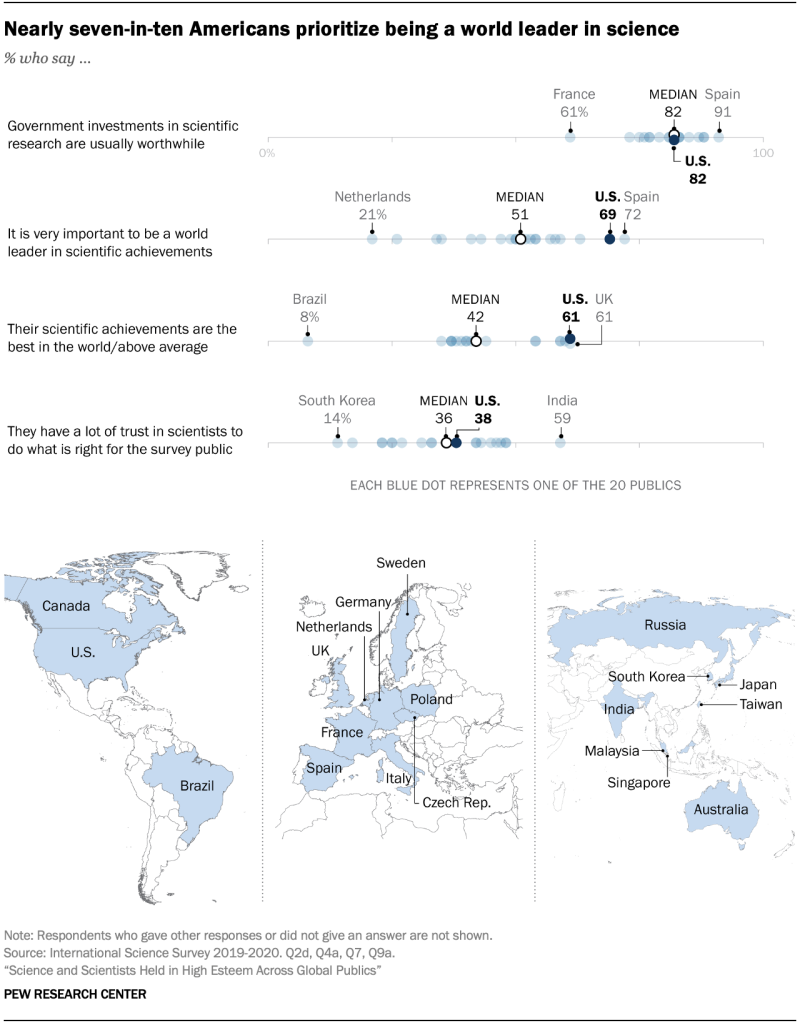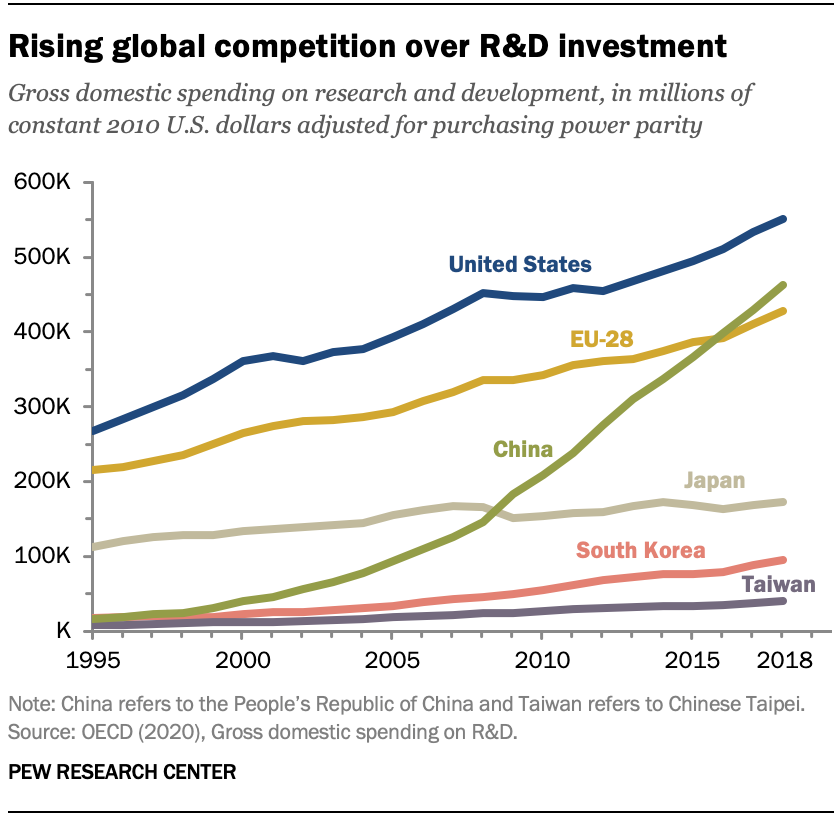Americans place high priority on being a world leader in scientific achievement and see positive returns from government investments in scientific research, according to a Pew Research Center survey of 20 publics conducted between October 2019 and March 2020.
The survey of adults in 20 countries or other publics with sizable or growing investments in scientific and technological development finds nearly seven-in-ten Americans (69%) think it is very important for the United States to be a world leader in scientific achievements. The U.S. stands out, along with Spain, for the high share of its citizens to hold this view. In many other publics, half or fewer place high importance on being a world leader in science.
To learn how people around the world see the place of science in society, we surveyed 20 publics across Europe, Russia, the Americas and the Asia-Pacific region from October 2019 to March 2020. The surveys were conducted by face-to-face interviews in Russia, Poland, the Czech Republic, India and Brazil. In all other places, the surveys were conducted by telephone. All surveys were conducted with representative samples of adults ages 18 and older in each survey public. Here is the full survey report.
Here are the questions used for this report, along with responses, and its methodology.
The U.S. has a rich history of scientific innovation and leadership, and a majority of Americans view the country’s current scientific achievements in a positive light: 61% say the country’s achievements in science are above average or the best in the world. Americans are more likely than people in most other publics surveyed to rate their scientific prowess highly. That compares with a 20-public median of 42% saying their scientific achievements are above average or the best in the world. Still, there are several places where comparable shares of people to the U.S. rate their scientific achievements as above average or better, including the United Kingdom (61%), India (60%), Australia (59%) and Japan (59%).
The new international survey in publics across Europe, the Asia-Pacific region, and in the U.S., Canada, Brazil and Russia comes as the global landscape for scientific research and innovation has shifted. In the past, the U.S. has had the largest share of spending globally on research and development. Sweden, Germany and Japan have also made sizable investments in research and development over time. But recent years have seen increased investments by Taiwan, South Korea and mainland China.
China is expected to equal or exceed the U.S. in global research and development investments in the coming years, according to data collected by the Organization for Economic Cooperation and Development.
Americans’ support for investment in scientific research, while high, is similar to levels seen in many other places. A large majority of U.S. adults (82%) say government investments in scientific research are usually worthwhile over time – the same share as the 20-public median – while just 15% of U.S. adults say such spending is not worth the investment.
Americans hold scientists as a group in high regard. About three-quarters of U.S. adults (77%) have at least some trust in scientists to do what’s right for the country, including 38% who have a lot of trust. Trust in scientists is widely held across the global publics surveyed, and views in the U.S. are very similar to the median opinion on this question.
Americans’ level of trust in scientists varies by partisan identification and political ideology, however. Two-thirds of liberal Democrats (67%, including those who lean to the party) have a lot of trust in scientists to do what is right for the country. By contrast, just 17% of conservative Republicans, including those who lean to the GOP, say the same (though a majority have at least some trust in them). Left-right ideological divides over trust in scientists are particularly strong in the U.S., but there also are significant divides in other places, including Canada, Australia, the UK, Germany and Italy.
Republicans and Democrats are aligned over the value of being a world leader in science and the state of U.S. scientific achievements. Nearly identical majorities of Republicans and Democrats, including those who lean to each party, say it is very important for the U.S. to be a world leader in scientific achievements (71% and 70%, respectively). Comparable majorities of both groups also view the country’s scientific achievements as above average or the best in the world.
And while there is broad agreement that the U.S. should be a leader in science, Americans see room for improvement when it comes to the current state of science, technology, engineering and mathematics education in the country. About half (52%) say STEM education at the college and university level is above average or better; nearly as many (46%) say it is average or below average. Ratings are particularly low for STEM education at the primary and secondary school level: Just 31% of Americans rate instruction at this level as above average or the best in the world. Republicans and Democrats are generally aligned in their assessments of STEM education in the country.
Note: Here are the questions used for this report, along with responses, and its methodology.





